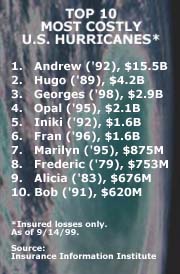|
Floyd sparks buying storm
|
 |
September 14, 1999: 3:51 p.m. ET
Residents load up on supplies as hurricane heads toward Southeast coast
|
NEW YORK (CNNfn) - As Hurricane Floyd continued its march Tuesday toward coastal Florida, Georgia and the Carolinas, area residents snapping up disaster-related supplies kept local stores crowded and busy.
Retailers were deluged with people loading up on any food, flashlights and other essentials they may need should the massive hurricane -- one of the most powerful hurricanes ever recorded in the Atlantic -- reach land.
"Holy moley, we've been slammed all day," said Bill Pachico, manager of the Albertson's supermarket in Melbourne, along the central Florida coast.
As of early Monday evening, the store had sold $71,000 in groceries, compared with just $27,000 last Monday -- which was the Labor Day holiday. In an average week, four truckloads of supplies are enough to restock the store; this Monday, according to Pachico, the store sold two truckloads of water alone and was awaiting delivery of a third.
Twenty to 30 people were lined up to get to each of the registers, although the customers' attitudes were "pretty good," the store manager said.
In the face of the storm, one shopping mall tenant may sell out its inventory, but barber shops, dry cleaners and movie theaters all suffer, said Randall Bell of Bell Consulting Group.
"I don't think it's a net plus for them," he said. "Some retailers really benefit and some really get a good kick in the shorts."
After a major disaster hits, shattered homes are exposed, leaving open the potential for lawsuits over shoddy construction.
"I hate to be stereotypical," Bell said, "but the lawyers usually come out real well."
Skip Helm, an analyst at William Blair & Co. said Floyd will probably bang up sales for Home Depot (HD).
"Absolutely, positively," Helm said. "After Hurricane Andrew, they had double digit sales for the next 24 months. If that thing blasts through, for the next two years they'll sell every home repair and home improvement item you can find in the Southeast. That's exactly what happened last time."

Craig Conroy, executive vice president of Conroy Research Group, said convenience stores and supermarket chains will also see a lot of action, while resorts and theme parks will be the big losers.
"People will stay away just on the fear that it could hit," he said.
Their avoidance was justified -- the theme parks at Walt Disney World outside Orlando were closed by hurricane Tuesday for the first time in their history.
Costly storms
The price tag of disaster can be staggering. Hurricane Andrew, which hit southern Florida in 1992, ranks as the most costly, inflicting $15.5 billion in insured loses, according to the Insurance Information Institute.
Hurricane Hugo, which hit the U.S. Virgin Islands, Puerto Rico, the Carolinas and other parts of the south in September 1989, comes in second at $4.2 billion.
The institute's catastrophe record shows a total of $10 billion in loss payments in 1998. As of May 1999, it had rung up $5 billion.
As traumatic as massive property loss can be, Bell noted a phenomenon he dubbed "the Santa Claus effect" in which homeowners, who had been planning to renovate their houses, see the work done for them -- in an extreme way -- by nature.
"Then along comes the insurance company and they get an entirely new home," he said. "They're just jumping up and down with joy. That's the Santa Claus effect."
|
|
|
|
|
 |

|

